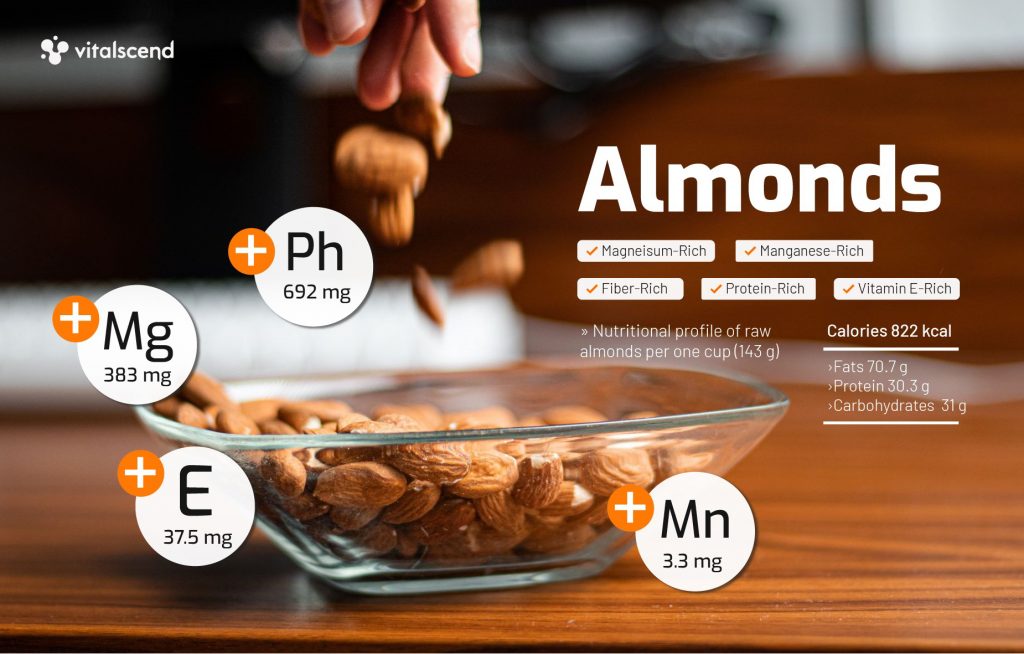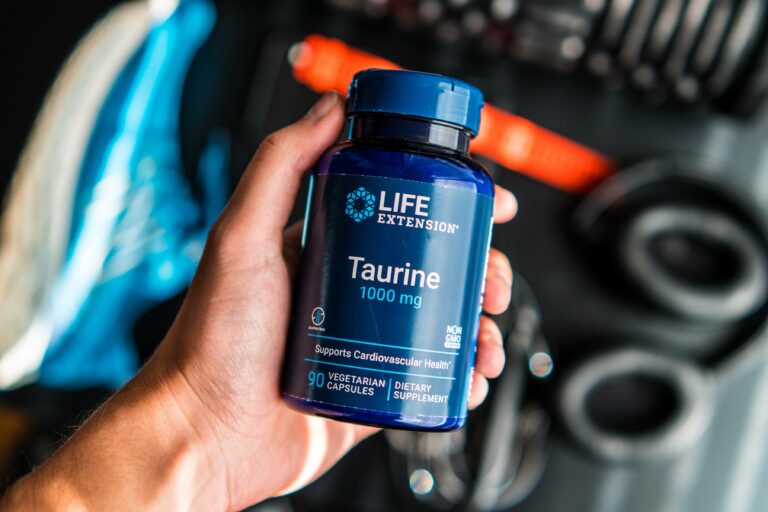6 Benefits of Almond Superfood | The Healthiest Nut On The Planet
Almonds: The healthiest nuts on the planet
Almonds are one of the healthiest nut alternatives we know of, due to their high fiber, low carbohydrate profile. But is almond a superfood? Yes, but is almond a nut? Turns out it is not.
Almond is a tree native to Iran, which is cultivated throughout the world including Australia, Greece, Italy, and Spain due to the climate that these countries offer.
What we call almonds, are the edible seed parts covered in the hull and hard shell. The fruit of almond tree is a drupe, a drupe is a fruit in which the endocarp with the seed inside is covered with outer exocarp (skin) and mesocarp (flesh). Other examples of drupes are peaches, coconuts, and cherries.
Almonds are rich in healthy monounsaturated fats which can enhance and support your hormone production, heart health, and brain function.
Almond is considered a superfood because it is loaded with vitamins, minerals, and tons of fiber which can be great in managing diabetes and can accelerate fat loss.

Multiple forms & varieties of Almonds
A variety of forms and types of almond products have grown in popularity, so here are a couple of examples:
| Raw & Organic almonds | Almond Milk |
| Roasted & salted almonds | Almond butter |
| Sliced natural almonds | Almond Oil |
| Dry Roasted & unsalted almonds | Blanched Almonds |
| Almond Flour | Sliced Almonds |
| Almond Water | Chocolate almonds |
| Honey roasted Almonds | Cinnamon roasted Almonds |
Being a good, fresh, and healthy alternative, can you just eat almond right off a tree? There are many little tricks and biohacks you can do to improve almond nutrient absorption, so keep on reading.
You can eat almonds whole, right from the tree, just make sure you have removed the hull first. Sun drying the almonds makes them taste better, and soaking them and removing their skin makes them healthier. (fewer oxalates)
Almonds can be eaten, and applied topically on the skin (in oil, cream, milk, or other forms), you can cook with them (almond flour, milk, water), and add them in shakes, smoothies, salads, and fruit bowls.
Are almonds healthier than cashews and walnuts?
All three are great options. Walnuts are more suitable for the brain, and have higher omega 3 content. Cashews are more on the healthy fats side, good for the heart, and pack a ton of minerals. Almonds are a bit less fatty, more amino-acid rich, which are great for muscle growth and physical performance, as they increase circulation b providing L-arginine.
Can almonds improve digestion and how?
Yes, they may. Almonds are very rich in fiber and prebiotics which can feed the good bacteria in your gut. This may therefore improve nutrient absorption and digestion, while boosting your immune system. The type of fiber present in almonds I soluble fiber, which slows down food processing allowing, to bulk the stool and increase pressure, which helps with constipation.
Nutritional profile
Almonds are one of the most nutrient-dense healthy fat foods on the planet. This drupe has many essential vitamins, phytosterols, minerals, and healthy monounsaturated fats. Phytosterols are plant molecules found in the cell membranes of plants that play role in cholesterol in humans.
One cup of whole almonds which measures around 143 grams (5.04 oz.) provides us with tons of vitamins, minerals, healthy fats, and fiber.
Keep in mind though, that one serving of almonds by the FDA is 1 oz. or 23 whole-shelled nuts which is a five-times lower amount than in the nutritional info I will give you here, which is present in 143 grams or one cup of whole almonds.
Vitamins & Minerals in Almonds
One cup (143 grams) measurements:
| Macronutrients | Vitamins | Minerals |
| Calories 822 kcal | Vitamin E: 37.5 mg (187% DV) | Calcium 378 mg (38% DV) |
| Fats 70.7 grams | Thiamin 0.3 mg (20% DV) | Iron 5.3 mg (30% DV) |
| Carbohydrates 31.0 grams | Riboflavin 1.4mg (85% DV) | Magnesium 383 mg (96% DV) |
| Protein 30.3 grams | Niacin 4.8mg (24% DV) | Phosphorus 692 mg (69% DV) |
| Folate 71.5 mcg (18% DV) | Zinc 4.4 mg (29% DV) | |
| Choline 74.5 mg | Manganese 3.3 mg (163% DV) |
Keep in mind that these numbers are present in one cup of almonds, which is a lot and not recommended to consume all at once. The profile of Almonds in one handful of around 23 almonds, which measures at around 1 oz. (28.35 grams) and it is one serving, that has those macronutrients:
- Calories 164 kcal
- Fats 14 grams
- Carbohydrates 6.1 grams
- Protein 6 grams
Levels of Vitamin E in almonds are pretty high and vitamin E was found to be helpful in skin care as a moisturizer, antioxidant, and wound-healing supporter.
Almonds are pretty rich in B vitamins like Thiamin (B1), Riboflavin (B2), and Niacin (B3) which can help to with energy production and play a major role in converting food to energy by supporting carbohydrates, fats, and protein breakdown.
The mineral profile of almonds is also impressive. Almonds are loaded with minerals that can support bone metabolism and maintain healthy and strong bones. These are minerals such as zinc, calcium, magnesium, phosphorus, and manganese. (1)
Benefits of Eating Almonds
Almonds and other nuts have been mostly consumed in high protein, high fat and low carbs diet, especially in nutritional protocol made for body recomposition programs where the goal is to shred off fat while building muscles, and in my opinion, this is the best vegan, raw and organic alternative for that purpose.
Besides its rich nutrient profile, loaded with essential vitamins, minerals, and antioxidants, almonds have high fiber content which can support digestion, and high healthy fat content which can support heart and brain function.
1. Supports Cardiovascular Health
Almonds have been shown to improve blood markers and cut the risk of cardiovascular diseases.
Almonds, due to their nutrient-dense profile can provide the heart with essential nutrients that can support optimal heart function. They are rich in many minerals that can assist in lowering blood pressure and reducing cholesterol levels.
Snacking on almonds can improve one’s lipid profile, reduce LDL “the bad cholesterol” and maintain HDL “the good cholesterol” levels. It is known to be a potential agent in improving cardiovascular health and lipid profile, added as a snack in a low-cholesterol diet. (1)
May Reduce cholesterol and oxidized LDL
Sixty-five prediabetic adult participants were given an almond-enriched diet by the American Diabetes Association, in which 20% of their calories came from almonds. Participants ate around 2 oz. of almonds each day for sixteen weeks. Markers of insulin sensitivity improved, while LDL (low-density-lipoproteins) levels were reduced. (2)
Fun Fact
A study found a difference between consuming almonds pre-meal or as a snack between meals. Both groups showed beneficial effects, but those who ate almonds pre-meal had a higher body-fat mass reduction, while those who ate almonds as an in-between meals snack had reduced levels of LDL and total cholesterol.
- Almonds were shown to exert a cholesterol-lowering effect in healthy humans. Almonds can also assist in improving blood and lipid profiles and reduce LDL cholesterol in diabetics and high-cholesterol patients. Almonds provide us with vitamin E, arginine, magnesium, copper, calcium, potassium, and manganese which are all known to exert some cardio-protective benefits. (3)
One of the major triggers of coronary diseases is excess levels of oxidized LDL, which is the bad cholesterol that can build up in your vessels and trigger cardiovascular disorders. It seems that almonds’ content of vitamins C and E can fight LDL oxidation. (4)
May Reduce blood pressure
Since high blood pressure can increase your risk of cardiovascular diseases, if we can find a natural alternative to lower it or stabilize it, it would be nice.
It turns out that Almonds, with their cardio-protective nutrients and many possible vasodilators (compounds that act on your epithelia to increase the diameter of blood vessels), may act to reduce blood pressure. Plus they are low in sodium. Some of the phytochemicals responsible for this are:
| methylquerecetin | p-hydroxybenzoic acid |
| protocatechuic acid | resveratrol |
| catechins | vanillic acid |
| flavonoids | kaempferol |
Almonds were shown to reduce systolic blood pressure and have no significant effect on diastolic blood pressure. (5)
Magnesium and Potassium are the two main essential minerals present in almonds that can help to reduce blood pressure in humans, due to their vasodilatory effects that may improve blood flow and prevent vasoconstriction. (6) (7)
2. Improves Digestion
Almonds are rich in prebiotics, which can feed the good bacteria in your gut. Ensuring a good ratio between good and bad bacteria can improve your digestion, increase nutrient absorption, and boost your immune system.
Fiber-rich, Prebiotic-rich
Almonds are also rich in soluble fiber, which can slow down food processing enabling your body to absorb more nutrients from the food you eat. The insoluble fiber is the one that bulks up your stool, increasing pressure, and can help with constipation, but in almonds, there is only the soluble version.
- It turns out that almonds and almond skin consumption can improve gut microbiota health by increasing the amount of good bacteria in the gut. (8)
- In this review, they assumed that with every gram increase of fiber intake daily, there is a reduction in 1.8% rates of constipation. Fiber can be potentially beneficial for digestion and the prevention of constipation. (9)
Biohack
Raw almonds are hard to digest, because of their texture, structure, and hardness they possess. The skin of almonds contains molecules known as tannins and phytates which inhibit enzymatic reactions on the nut, which makes it harder for you to digest it. Tannins can also interfere with iron absorption and bioavailability. So a great way to improve nutrient absorption while eating nuts is soaking them and peeling the skin off, which will eliminate oxalates.

3. Effective for Weight Loss & Diabetes Management
Almonds are amazing when it comes to weight loss or muscle building.
Blood Sugar Control And Satiety
Nuts in general are the purest form of lean food suitable for body recomposition, and by lean I don’t mean low on fat. Nuts are high in fats, healthy fats usually. They provide good amounts of plant-based proteins with all the essential amino-acid profiles and are low in carbohydrates which may accelerate fat loss and improve insulin sensitivity. (10)
Almonds are a great source of protein, fiber, and omega 3’s which can help in muscle building and fat loss. Also rich in L-arginine – important amino acid for energy, blood flow, and protein synthesis. (11)
Almonds Promote A Feeling Of Fullness
Nuts can suppress your appetite because they are full of fiber and monounsaturated fats. Polyphenols in nuts can exert antidiabetic effects. Nuts, especially almonds are rich in Arginine and Magnesium which can reduce inflammation and improve endothelial function and blood pressure. (12)
Being rich in fiber, almonds can increase the feeling of fullness and suppress your appetite, which can lead to weight loss. In this study, dietary fiber was shown to promote weight loss and dietary adherence in overweight obese adults who were put on calorie-restrictive diets. (13)
A Hypocaloric Diet With Almonds Promotes Weight-Loss
A caloric deficit diet leads to weight loss.
- When 100 obese women tested the hypocaloric diet with or without almonds, the almond group experienced greater weight loss and reduced risks of cardiovascular disease factors. (14)
- Consumption of almonds may improve cholesterol profile, reduce LDL and trygliceride levels, plus they were shown to reduce waist circumference. (15)
Improvement In Type 2 Diabetes
In 20 Chinese patients with type 2 diabetes mellitus, the almond diet group reduced their body fat percentage and increased vitamin E levels by 26.8%. Almonds intake reduced total cholesterol and LDL by around 6% and 11.6% respectively. The Almond group has lowered their fasting insulin and fasting glucose levels as well, which suggests that almonds have many beneficial effects on glycemic control and lipid profiles. (16)

4. Can Boost Brain Performance
Almonds are one of the most powerful brain-boosting foods out there. Their nutrient profile is brain supportive since they contain lots of vitamins like B6, vitamin E, and Riboflavin which can improve and support healthy brain function.
Besides that, fatty acids like omega 3s from almonds can reduce neural inflammation and oxidative damage, thus providing some anti-aging effects for your brain, potentially reducing or slowing down cognitive decline that comes with age.
Cognition & Memory
Anti-Inflammatory
Brain & Mood
Neuroprotection
- Almonds may increase acetylcholine levels which can improve memory function. Acetylcholine is a neurotransmitter that plays a major role in muscle activation and acts as a neuromodulator in your brain.
- In this study, repeated almond administration increased acetylcholine levels and improved memory retention in rats. (17)
- Women who ate more nuts in the long term showed better cognitive scores, so this cohort study suggests nuts as a good alternative to support cognition. (18)
Vitamin E is a powerful fat-soluble antioxidant that combined with omega 3s, which are also present in almonds can have multiple anti-inflammatory effects on the brain.
Higher plasma levels of vitamin E have been associated with better cognitive performance overall. Since cognitive decline is associated with oxidative stress on the brain, antioxidants can help reduce this damage and may improve cognition. Vitamin E can be a great agent for preventing cognitive decline. (19)
Omega 3s, just like Vitamin E (both present in almonds) can exhibit some antioxidant-like effects and reduce damage from oxidative stress on the brain. EPA, DPA, and DHA have neuroprotective benefits and may aid in the prevention of neurodegenerative diseases. (20)
Another vitamin found in almonds is B6. B6 is a vitamin that can influence cognitive function and brain development, it is an essential co-factor for the development of the central nervous system. (21)
Vitamin B6 is also important for mood regulation, since it plays a role in neurotransmitter synthesis, being a part of the tryptophan-serotonin pathway. Lower levels of B6 were related to depression. (22)
Almonds contain a bioactive component known as L-Carnitine. L-Carnitine is an amino acid whose main function is to transport fatty acids into the mitochondria for β-oxidation, to produce energy. L-Carnitine can reduce oxidative stress and improve energy status. This amino acid can also support brain function and exhibit some neuroprotective effects. (23)
5. Acts as a Beauty Tonic
Almonds are used in a variety of cosmetic products because of their antioxidant-rich profile.
Dating back to Cleopatra, the Queen of Egypt, almonds were used in her diet and skincare routine, along with milk and honey.
Many skincare products consist of vitamins such as vitamins E, A, and C, which are known to possess strong anti-inflammatory properties.
Clear Skin
Almonds are rich in vitamin E, which is the main antioxidant for the skin and can also help with cell regeneration. A combination of vitamin E with Lactoferrin and zinc, orally, reduced acne significantly by the 10th week. (24)
Omega 3s present in almonds can save your skin from UVB damage. EPA and DHA-rich sardine oil were tested for their effect on skin redness. It resulted in reduced skin redness by 25%, when topically applied. (25)
Acne Prevention
These fatty acids were also beneficial in fighting inflammation and may be a potential agent in treating, reducing, or preventing ace, caused by high levels of inflammation. Supplementing with Omega 3s can reduce inflammation markers such as TNF-α, IL-6, and CRP, in the long term. (26)
Skin Regeneration
Due to the high presence of B vitamins in almonds, they can be beneficial for hair growth and a healthy scalp. Almond oil has been used for the treatment of scalp conditions, due to its high antioxidants like superpowers, nutrient nourishment, and improved circulation.
Women who consumed flaxseed oil (2.5 ml) that was rich in omega 3s experienced an improvement in many markers associated with skin health. Omega 3s led to decreased skin roughness, sensitivity, and scaling. Skin smoothness and hydration were increased, during these 12 weeks. (27)
6. May Increase Energy Levels
Almonds are rich in the amino acid L-Arginine which can improve blood flow, and energy production and may have anti-aging properties.
Improve Energy Production
L-arginine is found in many pre-workout supplements or energy boosters. The way arginine works is it affects Nitric Oxide levels in the body which can improve circulation. (28)
Now L-arginine is important because it can increase energy expenditure, thus helping with weight loss. It plays role in protein synthesis, ammonia detoxification, and its conversion to glucose and catabolism to produce energy. (29)
L-Arginine
Almonds can improve energy levels due to their L-arginine content which may affect food-to-energy conversion, blood flow & nitric oxide, and Human Growth Hormone. Affecting these three areas can be beneficial for energy production.
First, it is the vasodilatory effect, which means more blood can through the cardiovascular system, bringing more fresh oxygen and nutrients which can directly affect and improve athletic performance. Along with increased levels of HGH and function in protein synthesis and energy production, L-arginine can boost energy.
conclusion
Almonds are protein-rich and fiber-rich nuts, with high fiber and fat, and low carbohydrate content. Almonds are very nutritious, and packed with tons of vitamins and minerals. As with any nuts, almonds are fat-enriched and calorie high, studies show that almonds help reduce fat mass and LDL cholesterol. Other health benefits of eating almonds include improved digestion, blood sugar control, and brain function support. Soaking and peeling almond skin off can eliminate oxalate content.
Frequently Asked Questions
What are the benefits of eating almonds?
Some of the benefits of eating almonds include
- excellent source of nutrition, loaded with vitamins and minerals
- may improve heart health and cholesterol profile
- aids in digestion and improve nutrient absorption
- can be effective for weight loss and diabetes management
- may boost cognitive function and memory
- has potent antioxidants, is anti-inflammatory
- may act as a beauty tonic, clear skin and prevent acne
- may boost energy levels and improve blood flow
- provides high-quality protein
How to remove almonds’ skin?
The easiest way to remove almonds skin is by first soaking them in water, overnight. The next day, they’ll be much softer, and you can easily scrap the skin off your almonds, using your nails only. The reason for skin removal is to reduce oxalate count, to make a creamy almond butter or squeeze out the milk.
Can almonds improve digestion and how?
Yes, they may. Almonds are very rich in fiber and prebiotics which can feed the good bacteria in your gut. This may therefore improve nutrient absorption and digestion, while boosting your immune system. The type of fiber present in almonds I soluble fiber, which slows down food processing allowing, to bulk the stool and increase pressure, which helps with constipation.
Are almonds high in oxalates?
Almonds, as many nuts are relatively high in oxalates. In around one ounce of almonds there is approximately 120mg of oxalates. Most of almond’s oxalates can be removed by soaking them in water and removing the skin. In general, moderate consumption of nuts (almonds) is likely safe. However, if you have a problem with kidney stone formation or oxalates in general, make sure to consult your doctor first.








